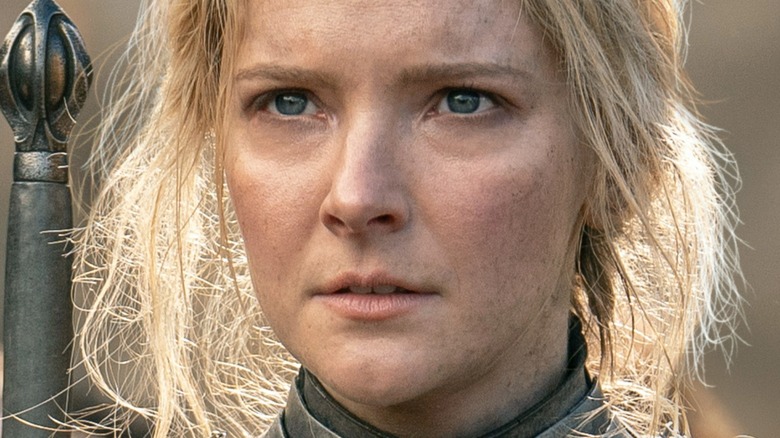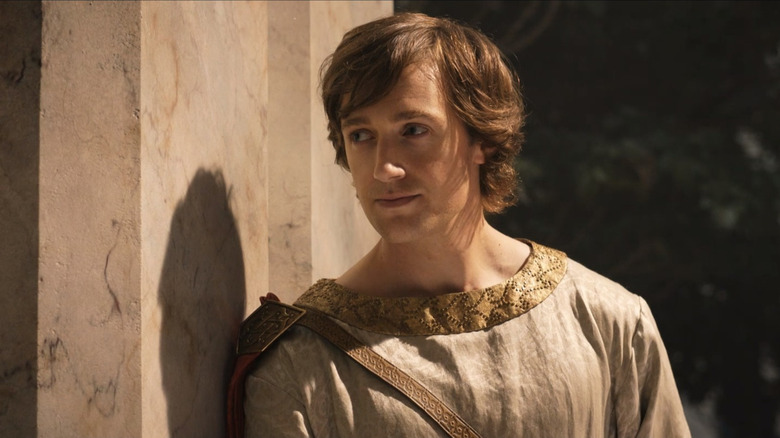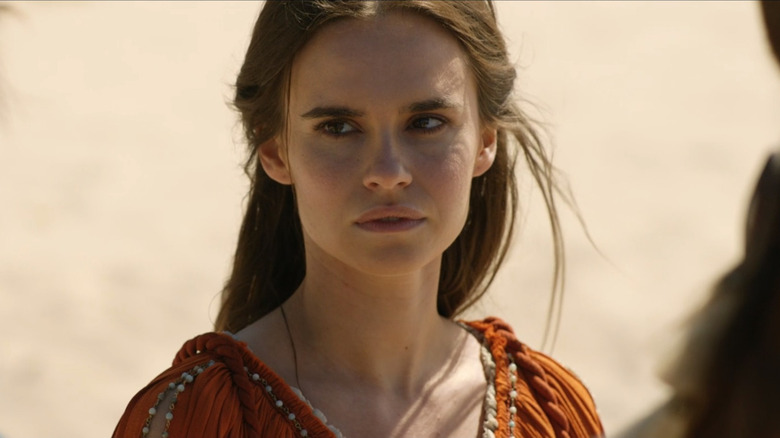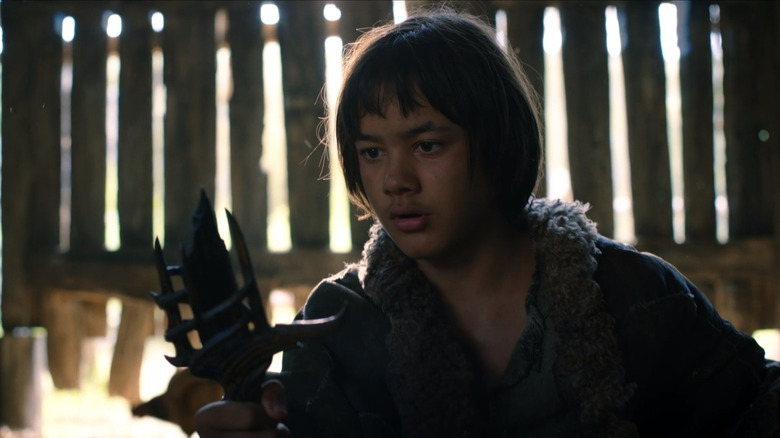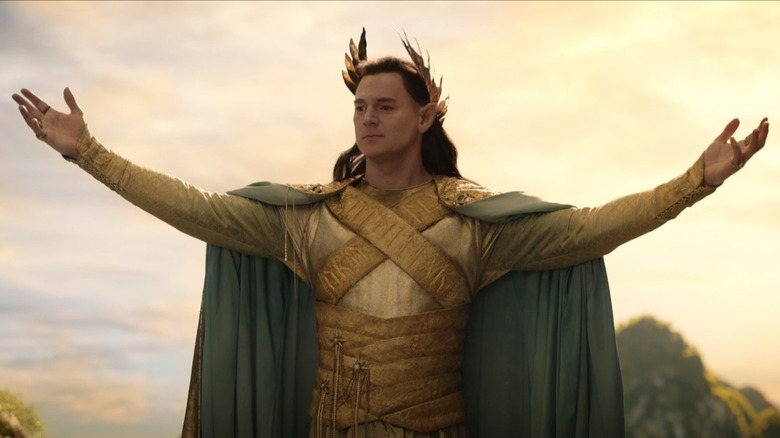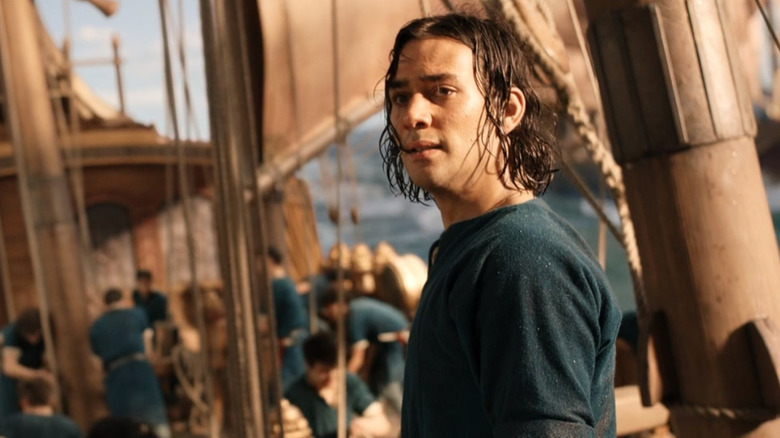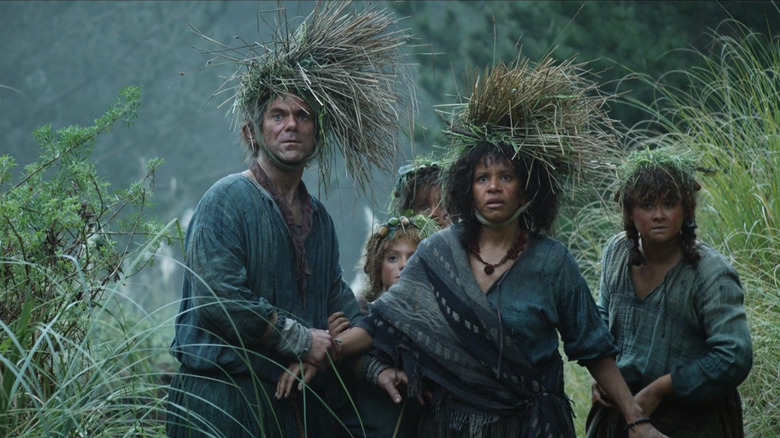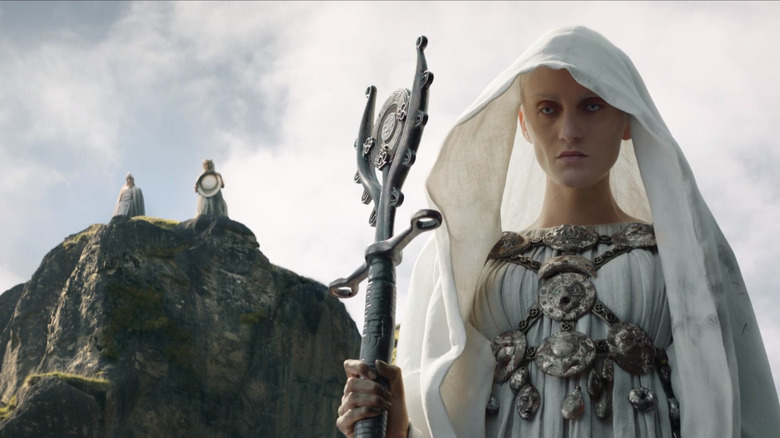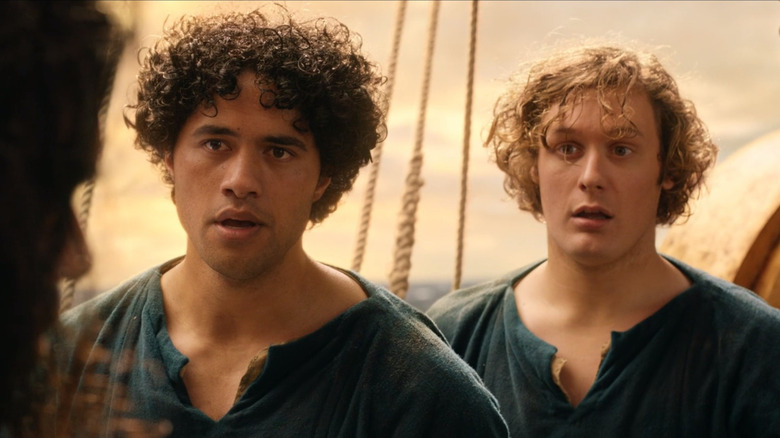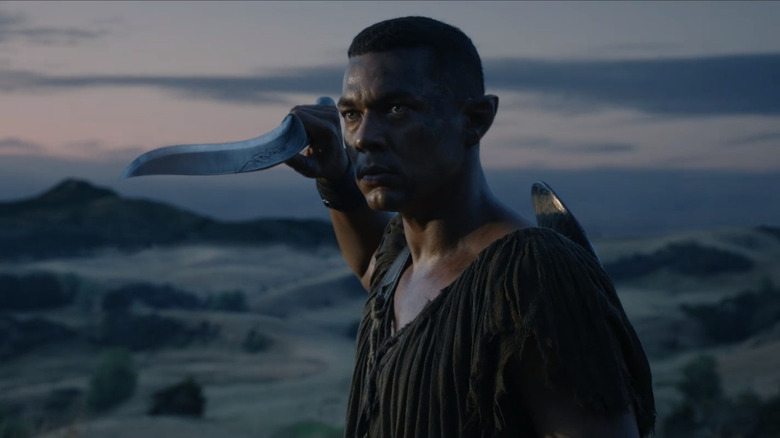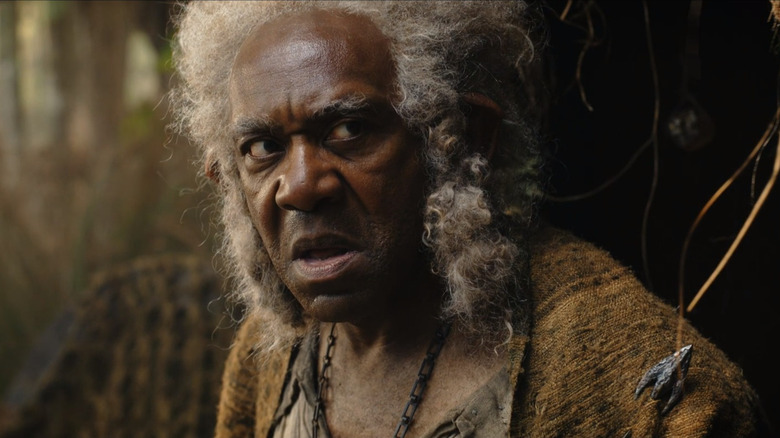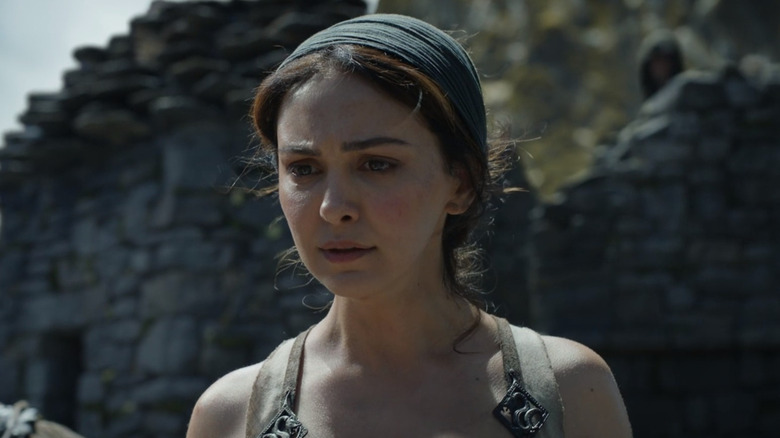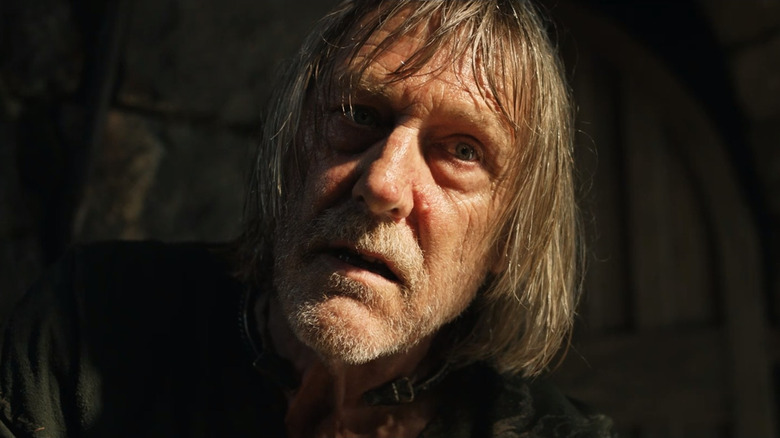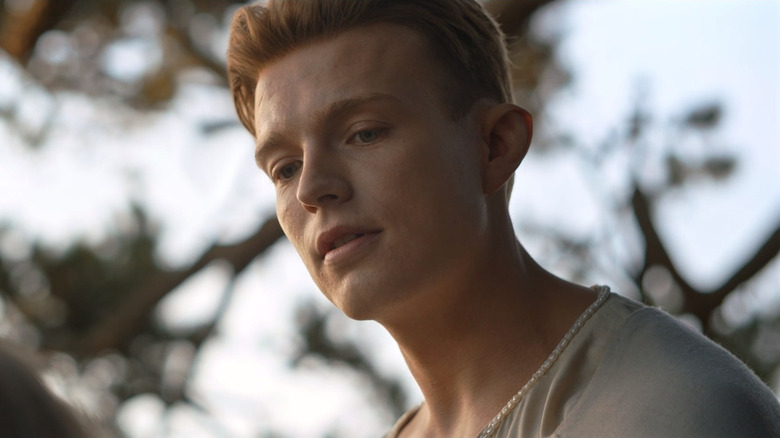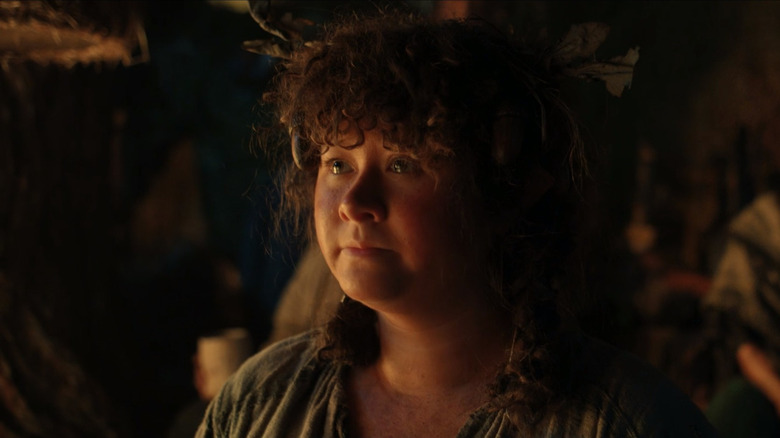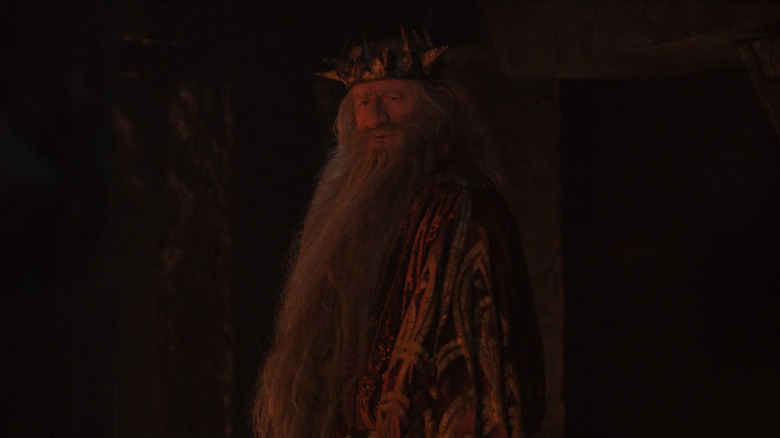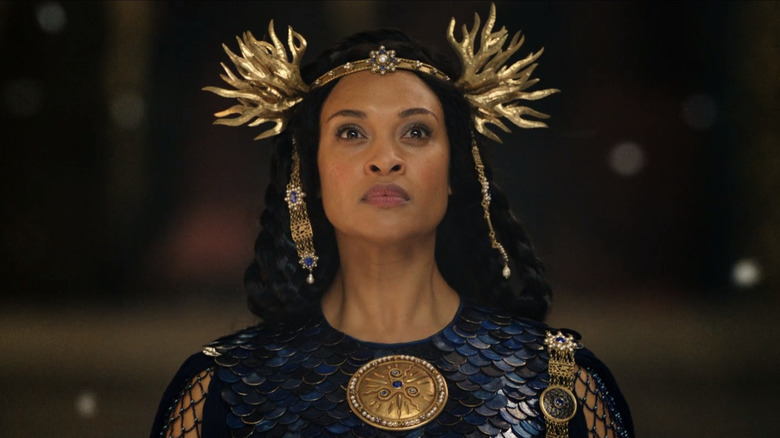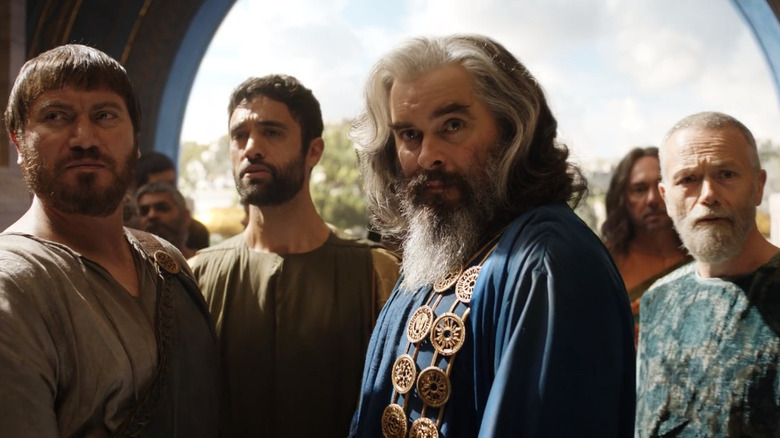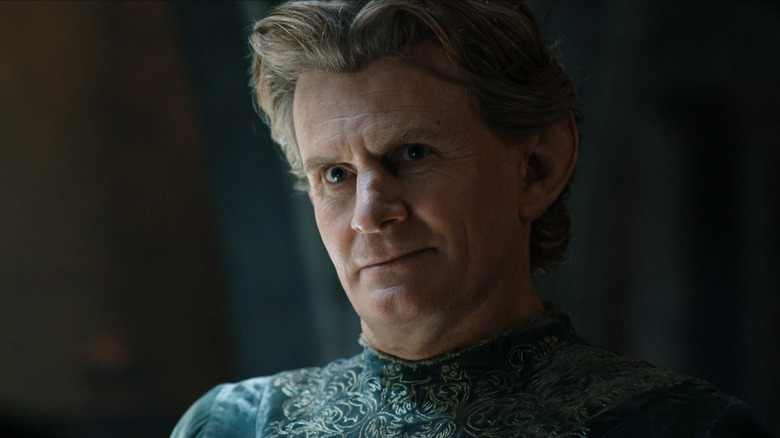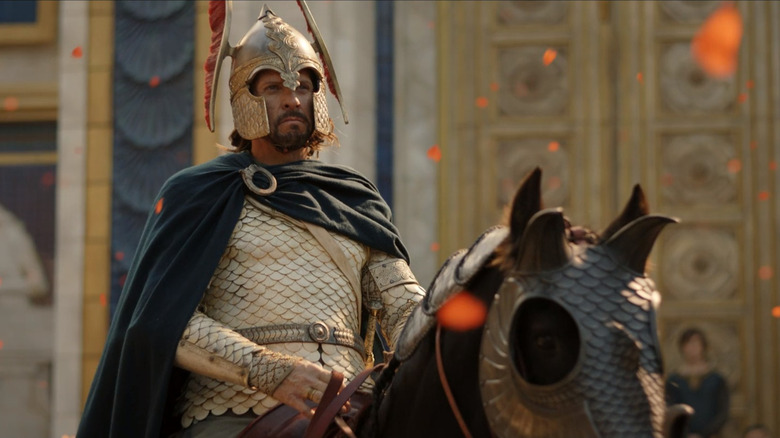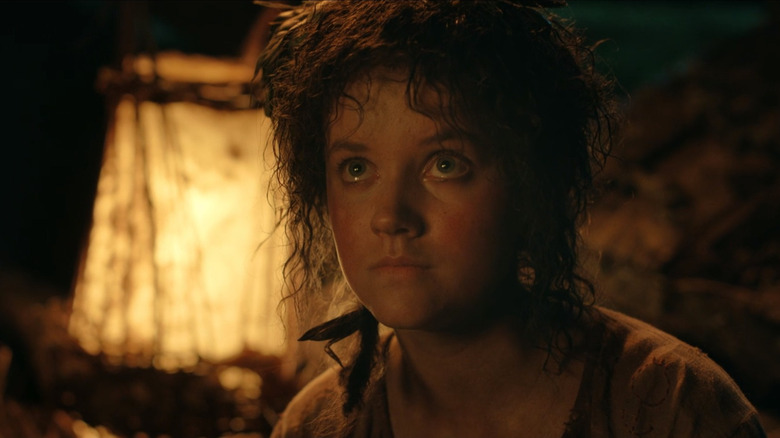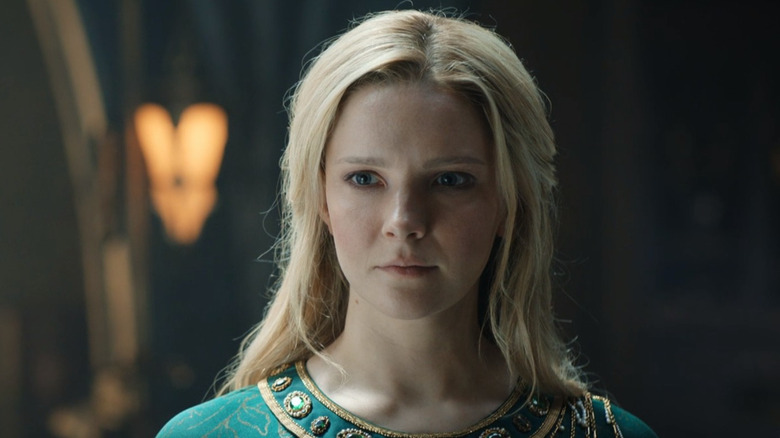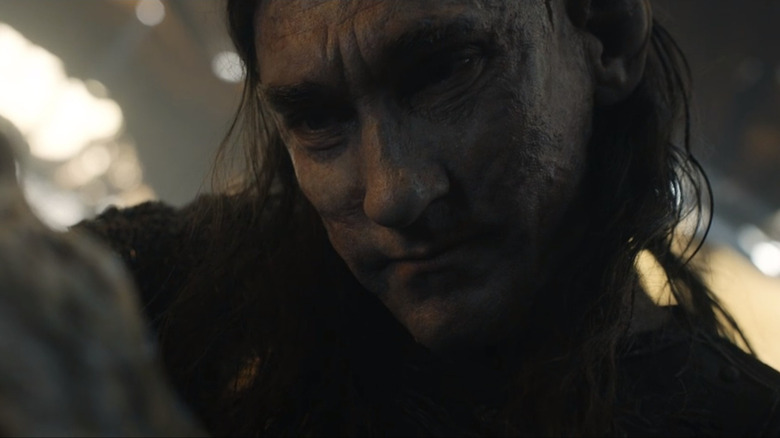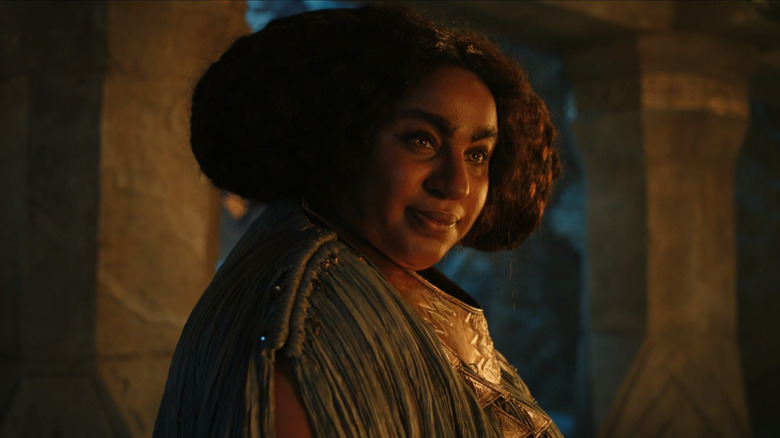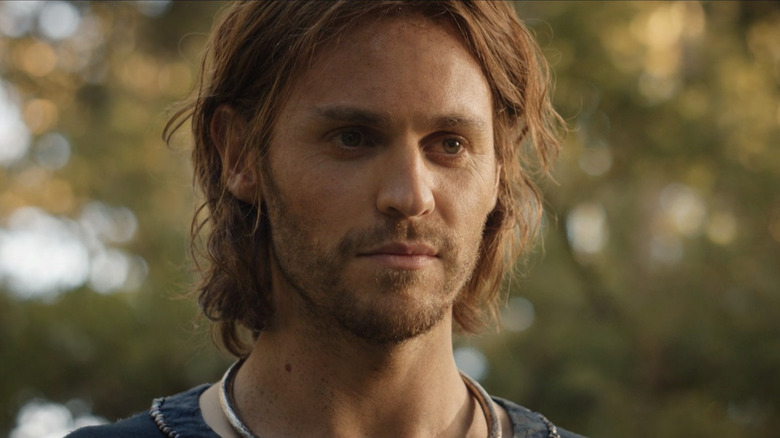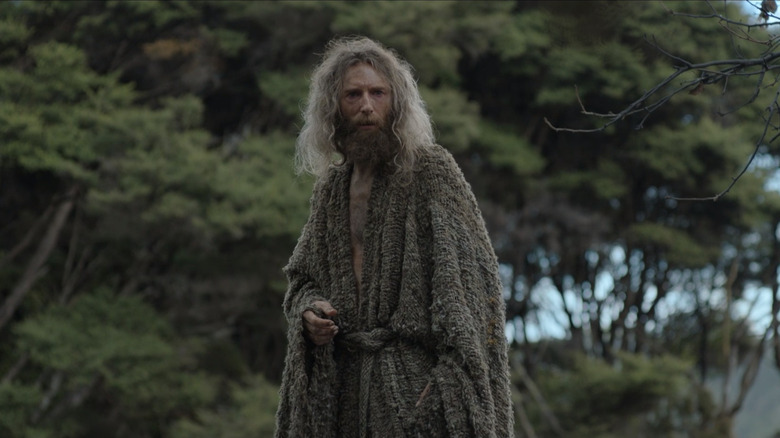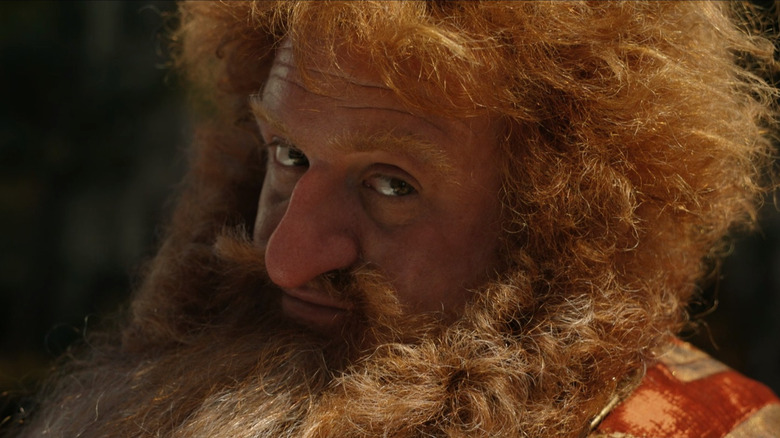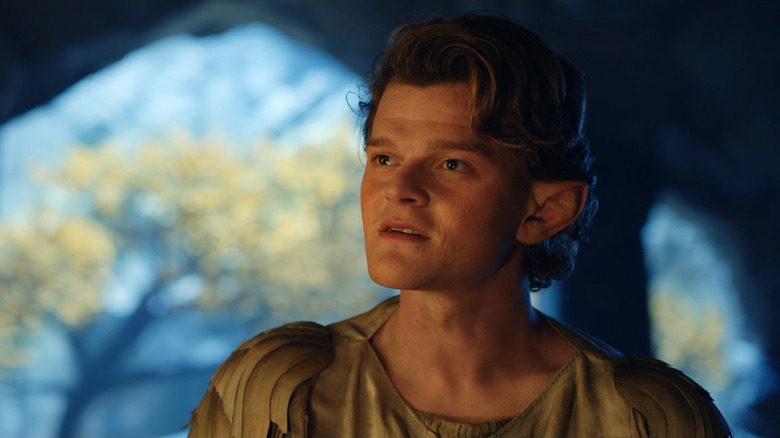Every The Lord Of The Rings: The Rings Of Power Character Ranked
The world of J. R. R. Tolkien would be nothing without the heroes and villains who inhabit it. Indeed, Middle-earth is home to some of the most famous characters in fantasy, and now, after the conclusion of Season 1 of Amazon Prime's "The Lord of the Rings: The Rings of Power," a few more names can be added to the list — as well as some reinterpretations of those we already know.
Telling the tales of Men, Elves, Dwarves, Harfoots, and even the Dark Lord himself, "The Rings of Power" boasts more than two dozen characters of note, yet some, inevitably, are more compelling than others. From the lords of Khazad-dûm to the smiths of Eregion to the sea captains of Númenor and beyond, this is every character in "The Rings of Power" ranked from worst to best.
This article contains major spoilers for both "The Lord of the Rings: The Rings of Power" and Tolkien's books.
27. Kemen
Beren and Lúthien, Aragorn and Arwen, Samwise Gamgee and Rosie Cotton — Tolkien's works feature many great romances. However, the half-baked courtship between Kemen and Eärien in Season 1 of "The Rings of Power" is not one of them. Kemen, son of Pharazôn, meets Eärien after one of his father's speeches, prompting the two to go on the Númenórean equivalent of a dinner date.
As they discuss the imminent expedition to Middle-earth, Eärien asks Kemen to convince Pharazôn to prevent the ships from departing for fear of losing Númenórean lives overseas. Kemen fails, decides to blow up a ship instead, gets bailed out by Isildur for some reason, and then promptly vanishes from the story altogether. And that's it. Portrayed by Leon Wadham, Kemen is more or less a total non-entity in "The Rings of Power." His act of sabotage against Elendil's ships indicates some potential for him to be less thoroughly forgettable in Season 2 and beyond — but at this point in time, we're not holding out much hope.
26. Eärien
Eärien is the only member of Elendil's family to have been created by the writers of "The Rings of Power." She's a character with some potential — as a daughter of Andúnië, she might join the ranks of the Faithful somewhere down the road, but as an apprentice of the Builder's Guild, she's just as likely to fall in behind Pharazôn and the King's Men. Sadly, we'll have to wait a while to find out. Played by Ema Horvath, Eärien is a character that is only barely more present in Season 1 than her brother Anárion — who literally does not appear at all.
This poses a particular problem when the show asks us to care about her troubles, even though some important actions involve her. In Season 1, Eärien has been admitted to the Builder's Guild, and her brother is marching to war. She is also drafted to design the tomb of Tar-Palantir (whose exclusion from this list is due to his status as little more than a glorified extra). These are all dramatic situations, but they revolve around a character who sees maybe two minutes of cumulative screen time. At the very least, Eärien's final scene, in which she discovers the Palantír in the highest chamber of Tar-Palantir's tower, promises an actual purpose for her later in the story.
25. Theo
It's easy to see where the writers were going with Bronwyn's teenage son — he's a rebellious youth subjected to troubling influences who ultimately chooses to stand with his family and fight against Adar's forces. He's also enough of a question mark to get fans speculating over his eventual fate and identity. Is he the Witch-King of Angmar? The King of the Dead? A distant ancestor of Eorl the Young, founder of Rohan?
With any luck, Theo will turn out to be none of these people. Portrayed in "The Rings of Power" by Tyroe Muhafidin — who isn't really to blame here — Theo is a staggeringly irritating character, one whose potentially fascinating arc quickly devolves into running around the Southlands calling for his mother.
There are a few aspects to Theo's character that are worth mentioning, such as his cowardice, which is portrayed not as an unheroic defect but as something that is totally understandable in a boy caught up in a brutal war. His relationship with Arondir, and the way their bond grows through hardship, is also believable, if not massively gripping. For a few episodes, it almost looks like his attraction to the mysterious sword hilt might result in a Ring-like obsession, but that goes pretty much nowhere, too. Ah, well.
24. Gil-galad
In "The Fellowship of the Ring," Samwise Gamgee remembers "The Fall of Gil-galad," a lay that tells of the heroics of the last king of the Noldor. In part, Sam sings: "His sword was long, his lance was keen. His shining helm afar was seen; the countless stars of heaven's field were mirrored in his silver shield."
It's impressive, no doubt. So what on Middle-earth is going on with the version of Gil-galad we've seen in "The Rings of Power"? Played by Benjamin Walker, Gil-galad's role in the series is hugely underwhelming, acting largely as a foil to Galadriel's military ambitions and Elrond's rarely-seen political ambitions. It doesn't help that Gil-galad's motives feel so uncertain throughout Season 1. In Episode 1, does he actually believe that evil has returned or not? Why is he so willing to flee Middle-earth in the finale when earlier he claimed that doing so would result in "the end of all peoples?"
Worse still, Walker strains to find the otherworldly aura that his Elven co-stars achieve so easily, leaving Gil-galad as something of an afterthought in the show's Lindon and Eregion storylines. All things considered, it's going to take a lot of work to convince us that this is the venerable Elven-king who will one day cast down Sauron on the slopes of Mount Doom.
23. Isildur
Maxim Baldry plays Isildur in "The Rings of Power," a version of the character that is very far removed from the hero known and revered by the Men of the Third Age. The intention is clear: Isildur is supposed to be a young, green sailor with scant experience of the world and an uncertain destiny. Unfortunately, the show's attempt to depict Isildur as such takes him slightly too close to outright annoying.
That's nothing against Baldry himself, who gives a perfectly decent performance with what he's got, and who will likely get a lot more to play with in later seasons. Isildur's story in Season 1, however, is hardly endearing. He decides against joining the Sea Guard of Númenor, intentionally sabotages his ship to get himself thrown out (leading to Valandil and Ontamo's expulsion alongside him), worms his way into a place on the Middle-earth expedition using good ol' fashioned nepotism, and then takes a whole house to the head after Orodruin erupts.
Put it this way — you can't exactly see this guy leading an army into Mordor during the War of the Last Alliance. Still, at least Isildur has four more seasons of character development ahead of him. Perhaps we shouldn't write off this future king of the Dúnedain just yet.
22. Largo and Marigold Brandyfoot
Among the more visible Harfoots in "The Rings of Power," Largo and Marigold Brandyfoot are probably the least memorable. Largo, played by Dylan Smith, is Nori's father, while Marigold, played by Sara Zwangobani, is her stepmother. These two actors handle their parts capably, and each of them gets to give their own heartfelt speech about what it is to be a Harfoot — even if Largo's, claiming that they "stay true to each other no matter how the path winds," is a demonstrably false depiction of these ruthless nomads.
There's certainly nothing wrong with Largo and Marigold, per se. They're just overshadowed by the other Harfoots, such as Nori, Poppy, and even Sadoc. In comparison, Nori's parents don't do all that much in Season 1 (fair play to Largo for threatening to lamp the Dweller with a torch, though) and, with Nori leaving to explore Rhûn with the Stranger, it's unlikely they'll have much to do in future, either.
21. The Mystics
The Mystics made their first appearance in a trailer for "The Rings of Power," sparking plenty of speculation about their origins. After a brief mix-up in which the fan site Fellowship of Fans claimed that their leader was Sauron, most fans' thoughts turned to the east. Sure enough, in the final episode of Season 1, it's mentioned that the Dweller, the Ascetic, and the Nomad — played by Bridie Sisson, Kali Kopae, and Edith Poor, respectively — came from Rhûn, the strange land at the far edge of Middle-earth's map.
Although their costume design is wonderful and the actors involved play their parts with suitable creepiness, the Mystics appear to have no purpose other than look menacing, misidentify the Stranger, and try to kill a handful of Harfoots. In that regard, they're more plot points than actual characters, although they do at least get to showcase some inventive magical abilities. Notably, the Dweller has a curious affinity for fire and the ability to shapeshift, powers that are utilized for maximum spookiness. They get a good send-off, too, in which they reveal their true wraith forms before the Stranger transforms them into moths.
That's the Mystics in a nutshell, though — cool, but not much else.
20. Valandil and Ontamo
Valandil and Ontamo are Isildur's friends in Númenor. They accompany him during the trials to join the Sea Guard before being kicked out alongside him when he decides on an impromptu career change. Played by Alex Tarrant and Anthony Crum, it would have been very easy for "The Rings of Power" to treat these two characters as trivial add-ons to Isildur's character. In fact, they come very close to being just that. Ontamo, in particular, doesn't survive until the end of the season, and during his time on screen we don't learn much about him other than his all-too-late discovery that war really isn't for him.
Valandil stands out a bit more, if only because he is given more to do. His confrontation with Isildur after their sea trials, in which he chastises his friend for "getting kicked out of something [he] never earned in the first place," brings some much-needed drama to Isildur's storyline. Meanwhile, his promotion to lieutenant after (sort of) besting Galadriel in a fight affords him a prime spot in the Orc-slaying action in the Southlands. Valandil is also noteworthy for delivering maybe the most ominous line of the season when he tells Isildur, "One day, I hope you find something that you would be willing to sacrifice anything for."
Yikes.
19. Arondir
Arondir is probably the most important original Elf in "The Rings of Power." Along with a small group of his fellow Silvan Elves, he has spent decades watching over the Men of Tirharad as punishment for their allegiance with Morgoth during the First Age. Over the course of the series, he struggles both with his romantic feelings towards Bronwyn, a mortal, as well as the discovery of a resurgent evil — Adar and his army of Orcs.
Ismael Cruz Córdova's casting as Arondir is inspired — aside from his almost unearthly good looks, Cruz nails the nimble physicality of a Wood Elf. That's a good thing, too, because Arondir's scenes with Bronwyn aren't quite as gripping as they ought to be, and you just can't help but think we've all seen the whole Elf-loves-a-mortal storyline portrayed better elsewhere in the legendarium and its adaptations.
Arondir is instead best placed in a fight, and most of his action scenes — such as his dawn escape through the woods with Theo and Bronwyn or his nail-biting showdown with a massive Orc in Episode 6 — mark high points in the series when it comes to stunts and choreography. Legolas, eat your heart out.
18. Sadoc Burrows
In a cast of relative unknowns, Sir Lenny Henry is arguably the closest thing "The Rings of Power" has to a household name. A renowned British actor and comedian, Henry plays Sadoc Burrows, the Harfoots' trailsman. Sadoc's purpose for much of the story is to lead the Harfoots on their journey to the east, using his trusty symbols and star charts as his guide. In the final episode, he joins Nori, Poppy, and Marigold on their mission to rescue the Stranger. Sadly, Sadoc is killed in the final battle.
More than any of the other Harfoots, there's something truly Hobbit-like about Sadoc. Maybe it's down to his gruff, grumpy demeanor, which the show often plays for laughs. Maybe it's Henry's performance, which is, inevitably, deeply charming. Perhaps it's Sadoc's willingness to step up and face the Mystics, giving his life to save somebody he barely knows. Either way, Sadoc — like many of his fellow Harfoots — is a fun addition to "The Rings of Power" and earns a place in the songs and tales of his descendants in the Shire.
17. Bronwyn
An original creation by the writers of "The Rings of Power," Bronwyn is a healer and apothecary who lives in the Southland settlement known as Tirharad. She is also Theo's mother and Arondir's lover, as well as the only Southlander who actually suggests they should consider killing Adar's Orcs rather than fleeing or joining them.
By and large, Bronwyn is a mixed bag. Her motherly relationship with Theo is somewhat frustrated by Theo being Theo, while her romance with Arondir is mostly convincing. Her best moments, however, come in the heat of battle. In Episode 2, she fights and then decapitates an Orc scout before slamming it down in the Tirharad Inn to prove her doubters wrong. Later, she leads the Southlanders against Adar and puts up an impressive fight against the invaders before taking an arrow to the shoulder and essentially bowing out for the rest of the season.
It's possible that Bronwyn will grow further into her role as a warrior as the show progresses, in the vein of Éowyn in "The Return of the King." If that's the case, then Season 1 did a good job laying the groundwork.
16. Waldreg
The Southlands storyline in "The Rings of Power" poses some interesting questions about the role Men played in Morgoth's domination of Middle-earth. In particular, Waldreg, the innkeeper of Tirharad played by Geoff Morrell, appears to be the incarnate representation of servility to authoritarian power.
Waldreg is a man who is so desperate to pull himself out of the mud that he proudly asserts his loyalty to the Dark Lord — and then, when the Dark Lord fails to present himself, simply defaults to the next monster in line. Where Southlanders such as Theo and Bronwyn rise above their fears and temptations to fight against the darkness, Waldreg gives in to them, dooming his entire people in the process. It's not a subtle lesson, but it's executed about as well as it could be.
Morrell clearly has a lot of fun with the part, too, giving Waldreg the same sort of sniveling obsequiousness that we've previously seen in characters such as Gríma Wormtongue in "The Lord of the Rings" and Alfrid in "The Hobbit" movies. While he's not quite as tragic as the former, it's definitely fair to say he's more enjoyable to watch than the latter.
15. Finrod Felagund
Finrod Felagund only appears briefly in "The Rings of Power," but his presence is felt throughout the series. He dispenses some brotherly advice to Galadriel in the prologue and ships off to war with the rest of his kin before meeting his end during a fateful encounter with Sauron. It's Finrod's death that drives Galadriel's unending desire to hunt down Morgoth's lieutenant and wipe every Orc off the face of the earth.
Considering his lack of screen time, Will Fletcher's portrayal of Finrod is surprisingly memorable. He encapsulates all the kindly grace and wisdom of a Valinorean Elf and, in the space of a single scene, skillfully showcases that loving sibling bond between himself and his younger sister.
This also serves to make Fletcher's return in the season finale absolutely terrifying. Here, Fletcher plays Sauron acting as Finrod inside Galadriel's head. Although their "reunion" takes place in the same setting as the prologue, everything here feels off — Finrod's mannerisms are uncanny, his smile is false, and even his eyes seem devoid of life. Much of this likely comes down to makeup and lighting, but Fletcher's switch from charismatic Elf to disquieting interloper nonetheless makes for a turn worthy of Barad-dûr itself.
14. Poppy Proudfellow
Megan Richards was just 19 years old when she was cast as Poppy Proudfellow, making her the youngest main cast member on the show. While we're not going to pretend that Poppy ranks up there with, say, Elrond or Galadriel, she still did a remarkable job making this loyal Harfoot as lovable as she is. Poppy is basically the Samwise Gamgee of "The Rings of Power." As Nori's closest friend, she begrudgingly allows herself to be caught up in the hijinx that follow the Stranger's arrival in Middle-earth. There's a more interesting angle to Poppy's character, however, which comes almost entirely out of left field halfway through the season.
In Episode 3, it's revealed that Poppy's entire family was killed in a landslide, leaving her to more or less fend for herself on the great migrations eastwards. This tragic backstory comes to the forefront in the final episode, in which Poppy asks Nori, "Why does everyone I love the most always have to go away?" Nevertheless, she lets her friend go and remains with the other Harfoots. It's a surprisingly moving climax to this unexpected mini-arc, one that Richards absolutely nails from start to finish.
Bonus points also go to Richards for performing "This Wandering Day," a highlight of the soundtrack and possibly the most Hobbity song not written by Tolkien himself.
13. Durin III
Durin III is another of Season 1's underused characters, although what little we see of him is nothing less than mesmerizing. Portrayed by Peter Mullan, King Durin is everything you would imagine a great Dwarf-king to be. He's as stubborn as a rock, as fierce as flame, and loyal to a fault — until he is wronged, that is.
For much of Season 1, Durin III mostly just hints at the existence of mithril and frustrates Prince Durin's attempts to mine it. Later on, though, Mullan is given a few scenes more worthy of his talent as an actor. His surprisingly tender heart-to-heart with his son is one example, but the flip side of that moment of forgiveness, in which he angrily strips Prince Durin of his collar, gives him a chance to really strut his stuff. This scene does much more than illustrate the increasingly strained relationship between the two Durins in Season 2 — and who wouldn't love to see Khazad-dûm embroiled in intrigue and unrest? It is also an important opportunity for Durin III to establish himself as one of the show's strongest characters.
12. Míriel
Míriel's role in Tolkien's Second Age is slight. She is mentioned only as a daughter of Tar-Palantir who is forced to marry Pharazôn before later being swept away in the great wave that consumes Númenor. In "The Rings of Power," however, her part is greatly expanded. Here, Míriel is Tar-Palantir's regent and the de facto ruler of the kingdom. Spurred by visions granted by a Palantír, she orders Elendil to lead a foray to rescue the Southlanders and restore Halbrand to his throne. It goes pretty badly.
Played by Cynthia Addai-Robinson, Míriel is another character who, despite being perfectly watchable in Season 1, clearly has more exciting things in store for her later in the series. It'll be especially interesting to see how the showrunners and writers approach the repressive and patriarchal fate that awaits her, considering they've done so well so far to instill some much-welcome agency in the character. For now, though, you'll find Míriel's best scene at the tail end of the season, in which she and Elendil struggle with their faith after their mission to Middle-earth.
11. Pharazôn
You wouldn't necessarily know it from the first season of "The Rings of Power," but Pharazôn will one day be one of the show's foremost characters. In the books, this Númenórean statesman seizes power in the late Second Age and rules the island kingdom as Ar-Pharazôn the Golden. Before long, however, he succumbs to the temptation of evil and pulls Númenor into oblivion.
In Season 1, Pharazôn is the chancellor of Númenor, a mere aide to Queen Regent Míriel. The show offers a number of hints towards his later story, however. There is his deft politicking in the court, for example, as well as his popularity with the common Númenóreans and clear distaste for the ways of the Elves. He is portrayed by Trystan Gravelle, who demonstrates a clear grasp of Pharazôn's purpose at this stage in the story — to provide a quiet and seemingly benign influence on life in Númenor, "mastering the current" rather than kicking against it.
Don't expect it to stay that way for long, however. When last we see him, Pharazôn is deep in thought beside Tar-Palantir's lifeless body, pondering his next move. With Miriel blinded and public opinion sure to turn against the Elves in the wake of the disastrous Middle-earth expedition, you can make a safe bet that Season 2 will see Pharazôn step ever closer to his terrible destiny.
10. Celebrimbor
You can't have "The Rings of Power" without the Rings of Power, and you can't have the Rings of Power without Celebrimbor. Played in the series by "Downton Abbey" star Charles Edwards, fans were understandably a little put out when Amazon offered a first glimpse at the show's version of the legendary smith. Mostly, they argued that he looked too old to play the part.
As it turned out, though, that didn't matter in the slightest. Edwards delivers an intriguing interpretation of Celebrimbor and one that tallies well with his book counterpart. His obsession over his craft is never portrayed as a matter of vanity or pure ambition but as a genuine desire to fill the world with beauty and, later, to prevent the fading of the Elves from Middle-earth. Edwards saturates Celebrimbor with those good intentions, forming a character who is giddy and passionate rather than domineering.
The only shame, really, is that Celebrimbor spends so much of Season 1 doing pretty much nothing at all. He geeks out over his new forge in Episode 2 and shows up once or twice after that, but doesn't come into his own until the season finale, in which he falls under the sway of Halbrand and allows his true desires to come to the surface. This, finally, is the Celebrimbor of Tolkien's Second Age — ingenious, resolute, and utterly doomed.
9. Elendil
Of all the major players in the events of the Second Age, Elendil is among the most important. Beginning the series as a mere Númenórean lord, Elendil is destined to become the leader of the political faction known as the Faithful, a sworn enemy of both Ar-Pharazôn and Sauron. Eventually, he becomes the first high king of Gondor and Arnor. In short, he's a pretty big deal.
Luckily, Lloyd Owen's turn as Elendil is a highlight of the Númenor storyline in "The Rings of Power." His Elendil is as stern and strong as you would expect from a captain of the Sea Guard, but the show also takes great pains to portray him as a loyal father to his children. As such, there's a geniality to Owen's performance that, while not immediately reminiscent of Viggo Mortensen's Aragorn, certainly lends something to their distant familial relationship.
Of course, Elendil's life is more tragic than his descendant's, having lost his wife to the sea and his son to Mordor — or so he believes — and that pain, while not overplayed, never seems particularly far away. This is a character whose faith is constantly tested throughout his life, as it will be as the show's story continues. That his return to that faith is so convincing, especially in Season 1's final episode, is a testament to Owen's skill as an actor.
8. Nori Brandyfoot
Bringing the Harfoots into "The Rings of Power" was always going to be a risky move on the showrunners' part. After all, these proto-Hobbits have no real role to speak of in Tolkien's legendarium, and they're only vaguely mentioned in "The Fellowship of the Ring" in the context of the early Third Age. So who needs them? As it turns out, "The Rings of Power" needs them. The Harfoots do exactly for the series what Hobbits do so well in the movies and the books, which is to provide a smaller, humbler perspective on a world of high politics and illustrious heroics.
The heart of the Harfoot story, the Bilbo Baggins of the Second Age, is Elanor Brandyfoot. Played by Markella Kavenagh, Nori is a caring and inquisitive young Harfoot who becomes embroiled in the matters of the big folk when she discovers the Stranger after his arrival in Middle-earth. Their friendship isn't without its troubles, but Nori's persistent belief in the Stranger's good nature constitutes the exact refutation of cynicism that is rife in Tolkien's work yet rarely exists in modern fantasy.
In the end, Nori realizes she's part of something bigger and embarks with her new friend on an adventure to the furthest reaches of Middle-earth. If that isn't pure Tolkien, what is?
7. Galadriel
Galadriel's journey lies at the forefront of the story of "The Rings of Power." Her quest to discover and destroy Sauron, thus avenging the death of her brother, seems like a simple foundation upon which the rest of the show can be built, and it would have been easy to leave it at that. Galadriel is an obvious choice of hero and Sauron is a clear villain.
"The Rings of Power" does so much more with Galadriel, however. Her relentless pursuit is not depicted as a matter of heroism but of obsession and a number of characters outright tell her that seeking out so much death will only bring about more death. Even Adar tells Galadriel that her search for Morgoth's successor "should have ended in [her] own mirror." She isn't exactly vindicated at the end of the season, either, as it's revealed that Galadriel's endless warring has inadvertently spurred the return of the Dark Lord himself.
Evidently, there's a long way to go before this Galadriel will become the wise and powerful Lady of Lothlórien. That's the brilliance of it, though. The show's writers have managed to personify all the worst excesses of the Noldor in Galadriel — pride, passion, and hotheadedness — and afford her a character arc that is hinted at but never fully developed in Tolkien's books. Morfydd Clark's darkly ethereal performance, both reminiscent of and distinct from Cate Blanchett in the Peter Jackson films, is just the icing on the lembas.
6. Adar
In 2019, Deadline reported that Joseph Mawle had been cast as "Oren," the series' lead villain. Correctly assuming that "Oren" was a production codename, fans speculated at the time that Mawle would therefore be playing Sauron in "The Rings of Power." The truth, however, turned out to be much more interesting than that.
At one point in the series, Galadriel names the corrupted warlord Adar as one of the "Moriondor," a word that was created by the show's writers. The concept, however, is well-known in Tolkien's work. In the 1950s, the author wrote that many Elves who journeyed across Middle-earth after their awakening were captured and twisted into the first Orcs by the Dark Lord, Morgoth. In "The Rings of Power," Adar is one of those Elves.
Adar, which literally means "father" in Sindarin, is a cruel and ruthless warrior who nevertheless has a softer, paternal relationship with the Orcs who worship him. It's a fascinating dynamic, one that sets Adar aside from the other villains of Tolkien's mythology, who tend to treat their underlings as wholly disposable. Mawle's performance is captivating, too, with the actor imbuing a sense of uneasy menace in the lofty grace you might typically expect from the Elves. All in all, Adar is one of Season 1's most welcome surprises — it's just a shame that he's as good as dead once Sauron walks back into Mordor.
5. Princess Disa
Princess Disa is a character unlike any we've ever seen in Middle-earth. It's not just that Sophia Nomvete is the first woman and the first Black person to have played a noteworthy Dwarf in a Tolkien adaptation — although that is an achievement in itself.
What makes Disa so remarkable in "The Rings of Power" is that she exudes a kind of boisterous warmth that is rarely found in "The Lord of the Rings" or "The Hobbit" movies. Hobbits live cozy lives, but they're often insular and suspicious of outsiders. The Elves are welcoming and (mostly) good-natured, but they're also haughty and prone to arrogance. Even the other Dwarves tend to be so caught up in their quests and their excavations that they forget the importance of all the comforts of home.
Disa, however, has it all. From the moment she greets Elrond with a massive hug and an invitation to dinner, this princess of Khazad-dûm shines. Disa's down-to-earth nature makes her fascinating to watch as she tells off her kids, bickers or flirts with her husband, and enjoys a good drink as much as anyone else. In a world populated by mythical heroes and terrible monsters, Disa is the most human, and perhaps the most relatable, character in all of "The Rings of Power."
Still, that's not to say there isn't room for Disa to walk a more sinister path in future seasons of "The Rings of Power." Her final scene in Season 1, in which she convinces Durin that they, not Durin's father, will one day rule the mountain and that they are the rightful owners of the mithril that lies within, suggests that Princess Disa is far more than a hug and a kind smile.
4. Halbrand
For much of Season 1, Halbrand seems like one of the more generic characters in "The Rings of Power." He's a rough, charming rapscallion running from his destiny as king of the Southlands. Sound familiar? They're not identical, but it's clear that Halbrand is supposed to invoke memories of Aragorn in "The Lord of the Rings."
Over time, however, it becomes clear that something else is afoot with Galadriel's new friend. Halbrand is cagey about his past, displays an unnerving knack for manipulation, and goes straight-up feral during a street fight in Númenor. All of this foreshadows the show's big reveal: Halbrand is, in fact, Sauron, the erstwhile sorcerer of Morgoth and future Dark Lord. It's a moment that delivers not only the best line in the whole season but also an absolutely stellar turn from Charlie Vickers.
The truth of Halbrand's identity also sheds a fascinating new light on a villain best known in pop culture as being a big bad eye. Throughout Season 1, and even after its end, you're never quite sure whether Sauron's guise is genuinely repentant or simply committed to his deception. When he wants to remain in Númenor, is he looking for a new start or a new opportunity? Is it Galadriel's rejection that spurs him back to Mordor, or was that always the plan? At this point, of course, it doesn't matter, as the Halbrand persona has apparently fully given way to the evil of Sauron. If that means more room for Vickers to embrace the villainous side of his performance, then all power to him.
3. The Stranger
At first, nothing about the Stranger is certain. He is a wild, ragged man who arrives in Middle-earth in a crash of rock and a burst of flame. He is also a kind-eyed giant who stares at the stars and gives life with his touch. The Stranger fights wraiths yet kills fireflies. He is both "good" and "peril." Even Bear McCreary's theme for the Stranger is somehow both sinister and beautiful.
A man who falls to Middle-earth from the sky is not an idea without precedent in Tolkien's writing, and the Stranger's mystical quest to discover himself feels like it has been lifted straight from the author's poems. At the same time, his journey into Rhûn in Season 2 will likely take the series quite literally off the edge of the map, far beyond anything the author ever wrote.
Maybe that's the true duality of the Stranger's character. He is ostensibly an original character, or at least a very early iteration of one we already know, who inhabits an entirely original storyline, and yet it all feels so faithful to Tolkien's spirit. Much of that comes down to Daniel Weyman's superb portrayal of the Stranger, which captures the warmth and power that defines the nobler Istari later in Middle-earth's history. Still, credit should also be given to the showrunners for coming up with this storyline in the first place. By all rights, it shouldn't even be here — but we're truly glad that it is.
2. Prince Durin
In Peter Jackson's "The Lord of the Rings" trilogy, the only Dwarf of note, Gimli, is by and large relegated to the role of comic relief. The Dwarves are given more meat in "The Hobbit," which follows their quest to reclaim Erebor from the dragon Smaug, but it's "The Rings of Power" that truly captures the essence of Tolkien's Dwarves. Prince Durin isn't merely a bad mood with a beard whose only purpose is to crack jokes and belch (though he does both of those things). He's a fierce family man, a devoted son, and — as Elrond learns — a true friend to Elf and Dwarf alike.
Durin, portrayed by acclaimed stage actor Owain Arthur, provides the second half of Elrond's heartwarming and heartbreaking double act, doing so with remarkable success, especially considering the character is barely mentioned in Tolkien's writings. One of his finest scenes comes early in the show's narrative, in which Durin chastises Elrond for missing twenty years of his life — "the blink of an eye to an elf" — and Arthur delivers a performance that genuinely makes you believe that these two people, who were only introduced to the series an episode earlier, are old friends gone astray.
Meanwhile, Durin's relationship with Disa is arguably the beating heart of the show's Dwarven storyline, and his frayed bond with his father brings "The Rings of Power" as close as it'll ever get to Shakespearean drama. Basically — more Durin in Season 2, please.
1. Elrond
"He was as noble and fair as an elf-lord, as strong as a warrior, as wise as a wizard, as venerable as a king of dwarves, and as kind as summer."
That's how Elrond Half-elven is described by Tolkien in "The Hobbit," and it's an apt description — Elrond is not only one of the most prolific characters in the history of Middle-earth, but also one of the bravest and the warmest. He's an Elf who can lead whole armies against the darkness of Mordor and yet also provide a home for an elderly Hobbit, who rallies his people for thousands of years despite the unspeakable tragedies that afflict his own life.
It's not an easy role to fill, especially considering Hugo Weaving cemented himself as Elrond so firmly in the public consciousness after Peter Jackson's "The Lord of the Rings" and "The Hobbit" trilogies. Somehow, though, Robert Aramayo more than pulls it off. Bolstered by a wonderful story arc revolving around his wavering friendship with Prince Durin, Aramayo's performance as Elrond can be counted among the show's greatest strengths. He's affable yet shrewd, wise yet eager to learn, and an utter joy to watch from the get-go. As the seasons draw on, it's quite easy to imagine that this portrayal of the Lord of Imladris will become the definitive version of the character.
